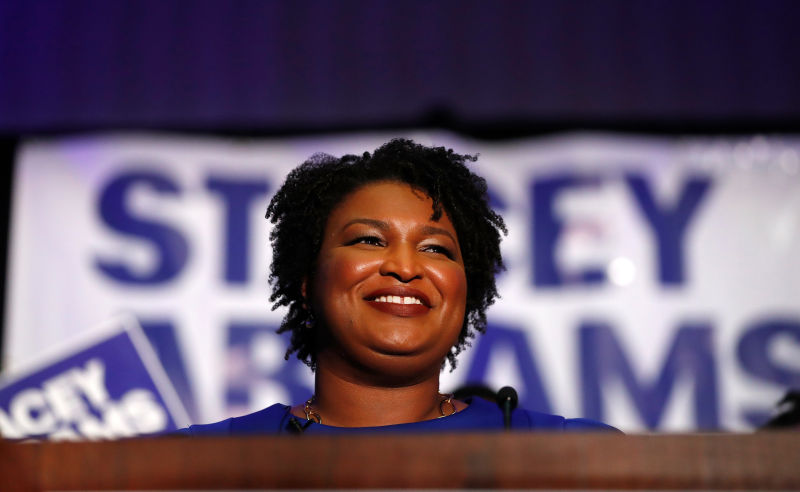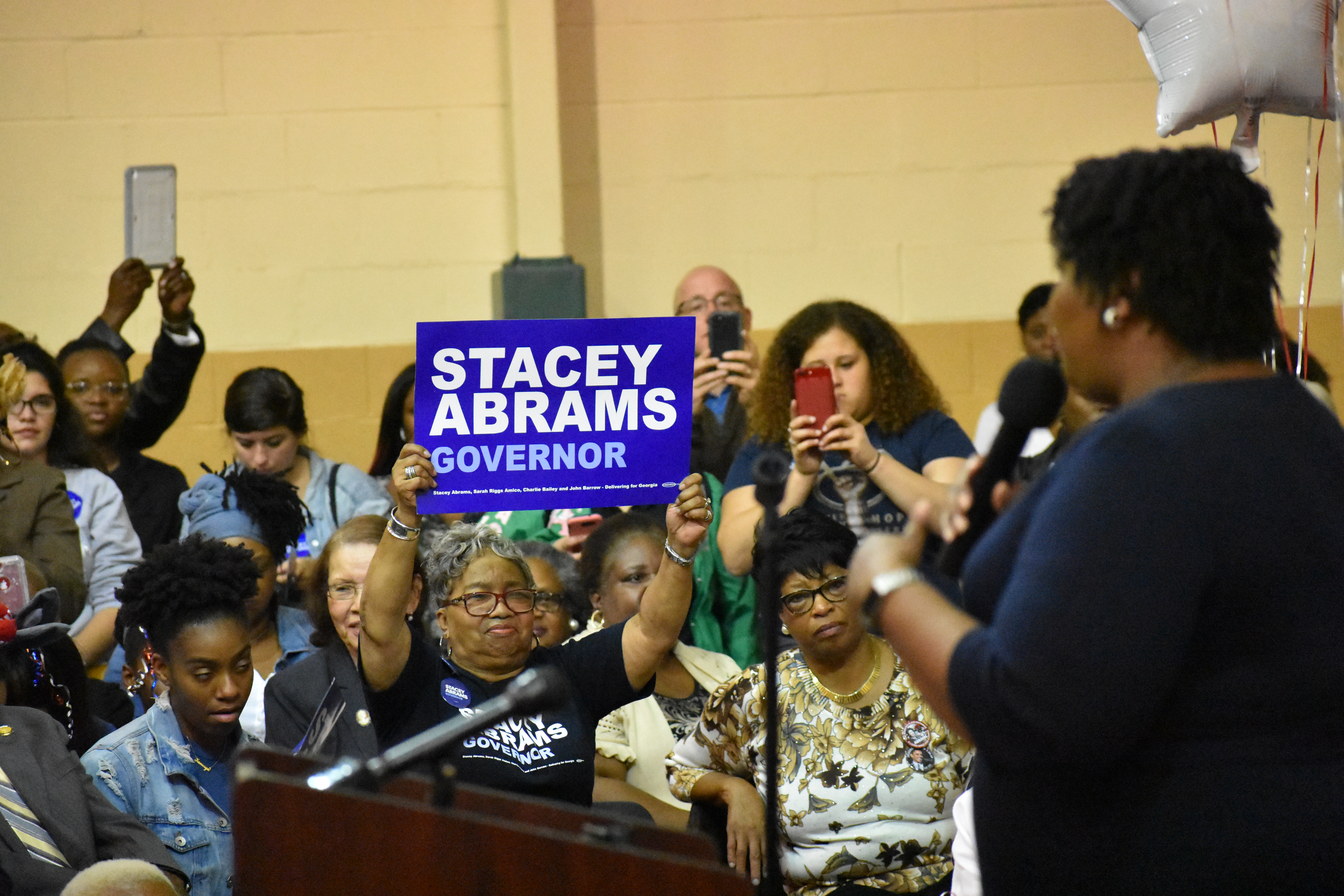
A Stacey Abrams Victory Would Show How Much Georgia Has Transformed
November 6, 2018Maybe there was something insightful in the words of Vice President Mike Pence when he came to Dalton, in northwest Georgia, to campaign for the man running against the progressive American dream. Pence came to stump for Brian Kemp, the Georgia secretary of state and steadfast Trump ally battling Democrat Stacey Abrams, who, if elected, would become the nation’s first female black governor. Pence told the crowd on Thursday that he had “a message for all Stacey Abrams's liberal Hollywood friends: This ain't Hollywood. This is Georgia.”
Georgia.
Indeed, the Abrams campaign has attracted an abundance of liberal celebrities to Georgia to stump for her and knock on doors, from Oprah Winfrey to Will Ferrell to Barack Obama. Celebrity power has definitely been on Abrams’s side, but the state house minority leader was also doing the kind of shoe-leather campaigning necessary to win in deep-red Georgia. Pence would have known that had he seen her in Augusta, speaking in front of a crowded community center gym two days before Election Day.
In Augusta, some of the mostly black audience members came in Atlanta Falcon jerseys (it was an NFL Sunday, after all). Others sported shirts with the symbols of historic African American fraternities and sororities. Still others carried miniature American flags they waved as 30 children led the crowd through the pledge of allegiance, followed by a soulful performance of the national anthem. The celebrity in the crowd was totally local—Deanna Brown, the daughter of Augusta’s native son James Brown, who warmed up the already-hot crowd for Abrams. You could travel all over the South, all over the country, and not find a more authentically patriotic scene.
But will the excitement and affirmation of crowds like this carry Abrams to history? Few polls have either Abrams or Kemp receiving 50 percent of the vote; if neither gets a majority there will be a December 4 runoff, which would exclude Libertarian candidate Ted Metz. That would leave Abrams with the challenge of having to reach out to Metz voters. After the rally, I asked Abrams about the strong possibility of a runoff and she demonstrated the kind of optimism that has driven the campaign from the start.
“The polls are focusing on likely voters,” she said. “These are voter models that are based on the '14 election, based on the '10 election. But we know that we've already seen a dramatic shift in the composition of the electorate. For the last 18 months, my campaign has focused on not just likely voters, but unlikely voters—those communities that are normally ignored and not included in our body politic, we turn them out, they showed up, they're voting, and we believe we can win this on Election Day.”

A statue honoring Confederate soldiers sits at the center of the square in downtown Covington, the seat of Georgia's Newton County. Thirty-five miles east of Atlanta, the county has gone through enormous changes in the 21st century. At the time of the 2000 Census, 75 percent of the population was white, and George W Bush carried the reliably Republican County in both 2000 and 2004. But the Census now estimates that the county is 45 percent African American, and it’s turned more Democratic lately. Obama edged John McCain and Mitt Romney in the 2008 and 2012 elections, and Hillary Clinton defeated Donald Trump in Newton in 2016. Turnout in this county is crucial to the Abrams campaign, which explains why she was here Sunday.
Beyond Newton, there are several changes across the state that work in Abrams’s favor. The Atlanta metro region grew by 300 percent from 1970 to 2015, and during that period, the nonwhite population has grown from 22 to 44 percent, according to the Center for State and Local Finance at Georgia State University. A Pew study found that four other Georgia counties—Rockdale, Henry, Douglas, and Gwinnett—all became majority-minority between 2000 and 2013. These demographic changes have helped make an Abrams victory a possibility. Whether that possibility is realized depends on whether she can reach voters who have a mishmash of concerns, not all of which line up with traditional partisan ideologies.
In 2006, Alfred Baldwin moved his family from Prince George’s County, Maryland, to Covington for the lower housing prices and cost of living. Three years later he opened Sports Barber Shop, which was busier than ever on Sunday. Fathers with sons. Mom with sons. The Falcons–Redskins game blasted from the television. Naturally, the conversation turned to the governor’s race.
As a black voter who supported Trump in 2016, Baldwin says he catches friendly flack from friends. His vote definitely figures into the banter among the barbers. “I started off liking Trump a little bit,” he said. “I thought we needed a shake-up. I just want something new, something different. I'm off the bandwagon. I'm off the Trump bandwagon now. He just says too much stuff off the top of his head without really realizing the consequences of what he's saying. He’s too irresponsible in not thinking before he speaks.”
Now Baldwin's with Abrams, but there is divide among barbers here. For Derrick Fuller, the governor’s election has created a clear battle that tugs him back and forth. When he thinks about race and the future of the South, he’s eager to rush to the polls and vote for Abrams. However, if he thinks about his guns, Kemp, with his strong gun-rights rhetoric, feels like a better choice. (Abrams is a supporter of gun control.) “I’m leaning toward Stacey,” Fuller said. “I’m not a politics guy but I do like our gun laws right now. You know what I’m saying. I don’t really want to see change but I really want to see the South get changed. ”
David J. Dent, an author and associate professor at New York University, holds a joint appointment at the Arthur Carter Journalism Institute and in the department of social and cultural analysis. He is editor of the blog bushobamaamerica.com and the author of In Search of Black America. Follow him on Twitter.

